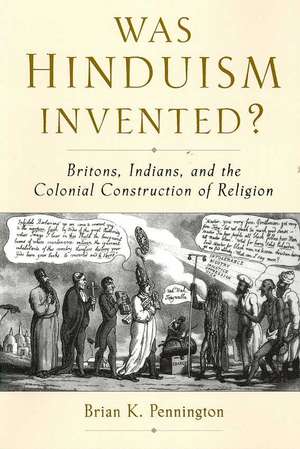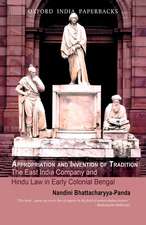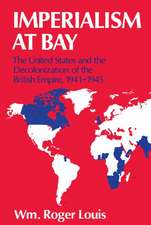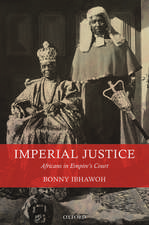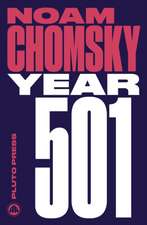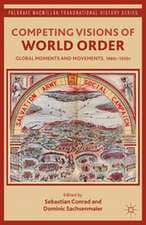Was Hinduism Invented?: Britons, Indians, and the Colonial Construction of Religion
Autor Brian K. Penningtonen Limba Engleză Paperback – 4 oct 2007
| Toate formatele și edițiile | Preț | Express |
|---|---|---|
| Paperback (1) | 214.91 lei 31-38 zile | |
| Oxford University Press – 4 oct 2007 | 214.91 lei 31-38 zile | |
| Hardback (1) | 575.05 lei 31-38 zile | |
| Oxford University Press – 19 mai 2005 | 575.05 lei 31-38 zile |
Preț: 214.91 lei
Nou
Puncte Express: 322
Preț estimativ în valută:
41.12€ • 43.97$ • 34.29£
41.12€ • 43.97$ • 34.29£
Carte tipărită la comandă
Livrare economică 07-14 aprilie
Preluare comenzi: 021 569.72.76
Specificații
ISBN-13: 9780195326000
ISBN-10: 0195326008
Pagini: 260
Ilustrații: 5 halftones, 10 line illus.
Dimensiuni: 234 x 156 x 14 mm
Greutate: 0.37 kg
Editura: Oxford University Press
Colecția OUP USA
Locul publicării:New York, United States
ISBN-10: 0195326008
Pagini: 260
Ilustrații: 5 halftones, 10 line illus.
Dimensiuni: 234 x 156 x 14 mm
Greutate: 0.37 kg
Editura: Oxford University Press
Colecția OUP USA
Locul publicării:New York, United States
Recenzii
The flourishing of new knowledge of India's past by British and European scholars and administrators, the emergence of a post-theological notion of religion based on an comparative paradigm of universal religiousness in the contexts of cultural specificity, an increasingly insistent Protestant mission movement, a secular utilitarian notion of civilization, and a new discourse of Hindu among Indians in India were taking place simultaneously in the early nineteenth century. Brian Pennington has investigated each of these threads and their interwoven complexity and located them within the matrix of the post-colonial academic study of religion. A worthy and worthwhile contribution to understanding a misunderstood past.
I read this study of cultural encounters between early-19th-century Hindus and British Christians with a sense of profound relief. The work complicates and problematises the simplifications that much of postcolonial studies operate with. By producing a richly textured account of religious debates and evangelical traditions in Britain, it not only provides a historical context for missionary lives, it also teases apart the multiple and contradictory strands within evangelicalism, normally taken to be a seamless monolith. Changes within modern Hinduism, similarly, are shown to be authentically internal developments that accommodate, but are not dictated by, the influence of new cultural encounters. Pennington deftly combines social and doctrinal themes, and his reading of Bengali, colonial, and missionary print cultures is stimulating. This is a book of many histories, all of which are complex and unexpected.
Pennington has written an important book that redirects attention to historical agents that mainstream postcolonial scholarship has largely either oversimplified or passed over. He helps to advance a new wave of scholarship that rejects the essentialism of stereotypical, unitary visions not only of 'the East' but also of 'the West.'
Was Hinduism Invented? is a timely and cogent reconsideration of Hinduism as a word, a concept and, refreshingly, a reality that became apparent in sharp focus in 19th-century British India. Penningtons command of primary sources combines with alertness to current issues in the study of religion to demonstrate why Hinduism, properly understood, sheds new light on how and on what terms India and the West discovered one another, why Hindus and Christians relate as they do today, and how religions are best conceived and studied.
I read this study of cultural encounters between early-19th-century Hindus and British Christians with a sense of profound relief. The work complicates and problematises the simplifications that much of postcolonial studies operate with. By producing a richly textured account of religious debates and evangelical traditions in Britain, it not only provides a historical context for missionary lives, it also teases apart the multiple and contradictory strands within evangelicalism, normally taken to be a seamless monolith. Changes within modern Hinduism, similarly, are shown to be authentically internal developments that accommodate, but are not dictated by, the influence of new cultural encounters. Pennington deftly combines social and doctrinal themes, and his reading of Bengali, colonial, and missionary print cultures is stimulating. This is a book of many histories, all of which are complex and unexpected.
Pennington has written an important book that redirects attention to historical agents that mainstream postcolonial scholarship has largely either oversimplified or passed over. He helps to advance a new wave of scholarship that rejects the essentialism of stereotypical, unitary visions not only of 'the East' but also of 'the West.'
Was Hinduism Invented? is a timely and cogent reconsideration of Hinduism as a word, a concept and, refreshingly, a reality that became apparent in sharp focus in 19th-century British India. Penningtons command of primary sources combines with alertness to current issues in the study of religion to demonstrate why Hinduism, properly understood, sheds new light on how and on what terms India and the West discovered one another, why Hindus and Christians relate as they do today, and how religions are best conceived and studied.
Notă biografică
Brian K. Pennington is Associate Professor of Religion at Maryville College in Tennessee.
